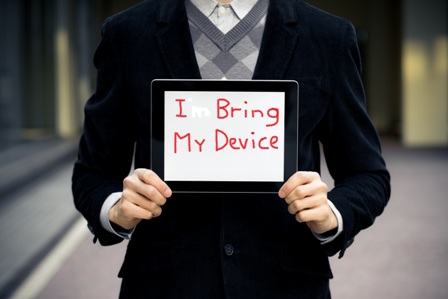A survey conducted by Ponemon Institute and sponsored by data protection and availability vendor Acronis from Woburn, Mass., found that the majority of companies are putting critical data at risk by not having secure bring-your-own-device (BYOD) policies in place.
According to Acronis, ignoring the security steps such as employee BYOD education, companies will put confidential data at risk, exposing it to theft, corruption, hackers, and malware.
Acronis’ 2013 Data Protection Trends Research, which evaluated responses from more than 4,300 IT professionals in eight countries, discovered that:
1. Big Gaps in BYOD Policy
- Almost 60 per cent have no personal device policy in place, and, among those with policies, 24 per cent make exceptions for executives, who may handle even more sensitive data. As a result, these organizations are increasingly vulnerable to data loss and serious compliance issues.
- A number of organizations are still in denial when it comes to BYOD trends, as more than 30 per cent surveyed actually forbid personal devices from accessing the network.
- Nearly 80 per cent of organizations haven’t educated employees on BYOD privacy risks.
2. Security Precautions Are Falling to the Wayside
- Just 31 per cent of companies mandate a device password or key lock on personal devices, and only 21 per cent perform remote device wipes when employees leave the company, drastically increasing the risk for data leakage.
3. Businesses Underestimate the Dangers of Public Clouds
- Corporate files are commonly shared through third-party cloud storage solutions such as DropBox, but 67 per cent of organizations don’t have a policy in place around public clouds and 80 per cent haven’t trained employees in the proper use of these platforms.
4. Businesses Fear Apple Devices Are Complicating BYOD Security
- While 65 per cent of organizations will support Macs in the next year, more than half (57 per cent) say compatibility and interoperability are still big obstacles to getting Macs compliant with IT, which puts data stored and shared across the corporate network and on Apple devices at risk.
Anders Lofgren, director of Mobility Solutions for Acronis, said personal devices have permanently and positively changed the workplace, particularly in the ways employees collaborate, work remotely and interact with company data. BYOD is a huge opportunity for companies, but our research shows troubling signs of negligence in the face of these dangers. However, with policies and solutions that manage the flow of data between multiple devices and environments, companies can practice safe BYOD with confidence.
Acronis suggests that to optimize BYOD, protect the bottom line, and avoid data loss and serious compliance issues, organizations should take immediate steps to ensure employees are trained in safe BYOD practices, that personal device and public cloud use are monitored and managed, and that effective data protection solutions are in place to prevent data loss. These are the critical steps to achieving safe BYOD.




